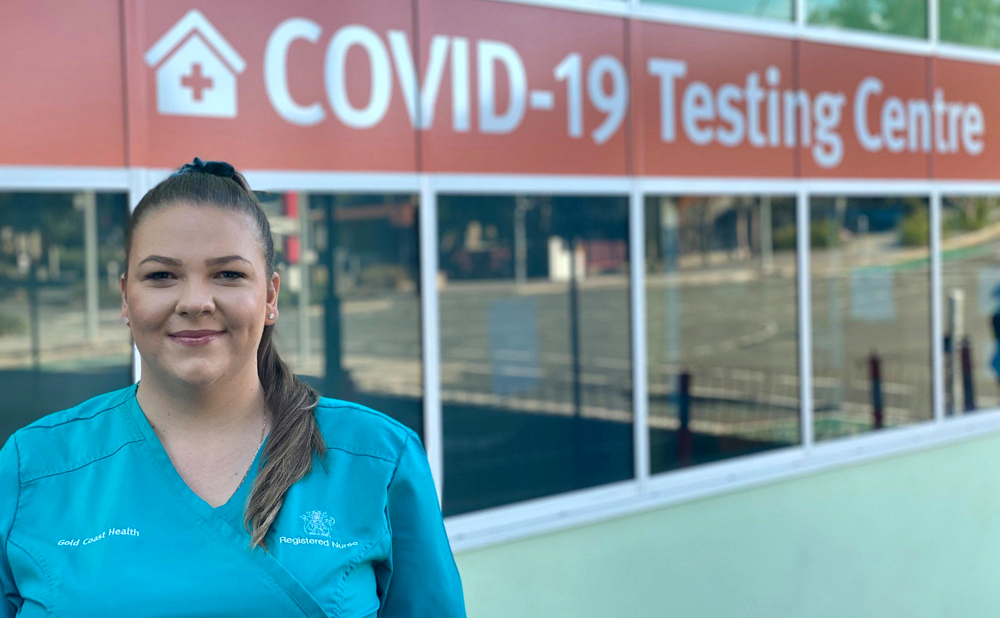The largest group of people who have become affected by COVID-19 in Queensland are women aged between 20-29 years.
Gold Coast University Hospital Immunology Unit nurse Topaz Stringfellow knows only too well how COVID-19 can affect young people – and how easily the virus can spread.
The 26-year-old volunteered to spend a month on the frontline assisting with Victoria’s response to the growing number of COVID-19 cases – and she was infected with COVID-19.
In this important role, she donned full PPE and worked long hours, swabbing thousands of Victorians in clinics set up across community centres, parks, hospitals and housing complexes.
Her message to young people: you are not immune to COVID-19.
Ms Stringfellow said she felt fine when a routine temperature check raised flags, days before she was due to fly back to Queensland.
“When we swab, we have full PPE for four hours at a time – that’s gown, gloves, face shield and mask,” she said.
“I didn’t know if the raised temperature was because I had just been running around.
“But that night I started to get fevers, headaches and body sweats and I got tested.
“For the first three or four days I only had fevers, headaches and I felt absolutely exhausted.
“On day five I lost my sense of smell and I got a slight cough and still had the fevers and the headaches,” she said.
On day six, she became short of breath and couldn’t even walk to the bathroom without struggling to breathe.
“I thought, I’m 26 and female, statistically I should be okay, but I got sicker than I expected,” Ms Stringfellow said.
“Part of me was scared, I knew some of the complications of COVID-19, particularly shortness of breath.
“I was scared I was going to go into acute respiratory distress syndrome.
“I was probably naive in the beginning. I think young people think they aren’t going to get sick but in Victoria I saw young doctors get sick and end up in ICU.
“I don’t think some young people see how sick young people can get or the effect it can have on grandparents or people in aged care.
“They don’t see how much harm their actions might cause.”
While Topaz has now made a full recovery, she said she is upset by seeing people her age not respecting social distancing rules and guidelines on gatherings.
“When I did the community swabbing, I saw a lot of people who had been at house parties and had been exposed and turned out to be positive,” she said.
“It’s so frustrating and sad because you see elderly people who are trying to do the right thing and have gotten really sick.
“In some cases, they won’t have a good outcome because of young people who haven’t been following the rules.
“It’s not just what we do for us, it’s what we do for our community.”
Queensland’s Chief Health Officer Dr Jeannette Young said women aged between 20-29 years make up the largest demographic of confirmed COVID-19 cases in Queensland.
“While confirmed COVID-19 cases may be the highest in Queensland in this demographic for a variety of reasons, it is likely that individuals of this age are more likely to socialise in close groups,” Dr Young said.
“It is important for everyone in our community, no matter your age, to follow health advice and restrictions.
“It’s so important to wash your hands, practice social distancing as much as possible, stay at home when you’re sick and avoid hugging, kissing and shaking hands.
“While the older you are, the more vulnerable you are from serious illness due to existing health conditions, COVID-19 can affect people of all ages.
“Globally, it’s not just older people that are dying of COVID-19. Many young people have sadly passed away from COVID-19 or become seriously ill.
“As we learn more about the virus, we’re learning that for a reasonable number of people, they don’t fully recover, they have long term consequences from the disease.
Dr Young said unlike flu, this virus can affect every part of the body.
“That means that although someone might fully recover from the infection, they can have long term consequences which can affect their lungs, heart, kidneys and their brain, and cause significant ongoing disease,” Dr Young said.
“If you do develop COVID-19 symptoms, such as a cough, runny nose or a sore throat, please take the time to get tested.
“It’s important we catch any COVID-19 cases as soon as they develop to limit the spread.”
Minister for Health Steven Miles said COVID-19 can cause serious complications, no matter what age you are.
“COVID-19 does not discriminate, we have seen babies to grandparents become ill with this virus,” Mr Miles said.
“It is so important that Queenslanders remain vigilant, keep social distancing and practicing good hand hygiene, if not for themselves but for the vulnerable in our communities.
“No one is immune, so everyone must continue to play their role in fighting COVID-19.”
Fever clinics and testing locations: www.westmoreton.health.qld.gov.au/coronavirus
For the latest contact tracing locations click here.
For information about COVID-19 in other languages, click here.
Read also:

